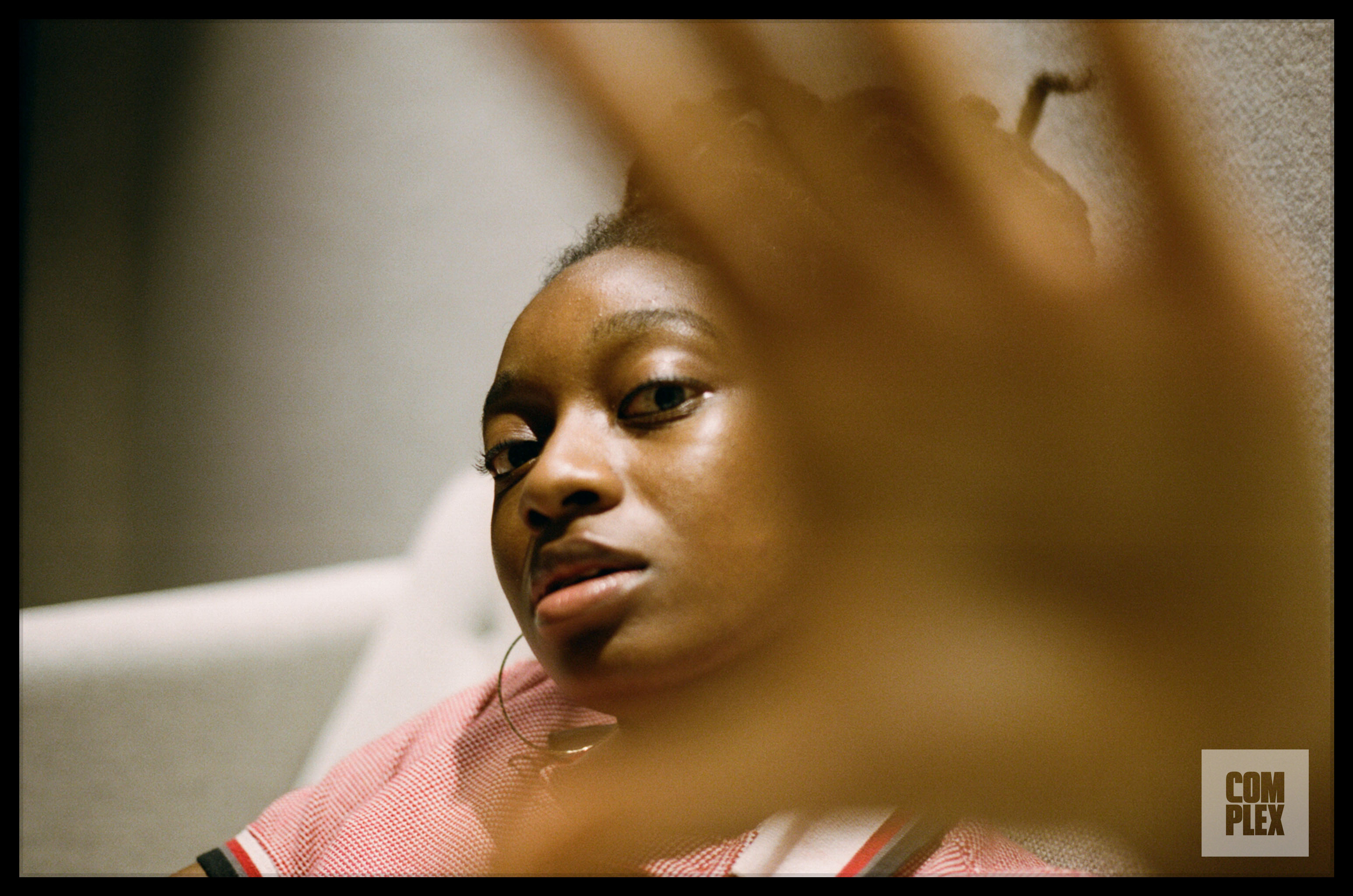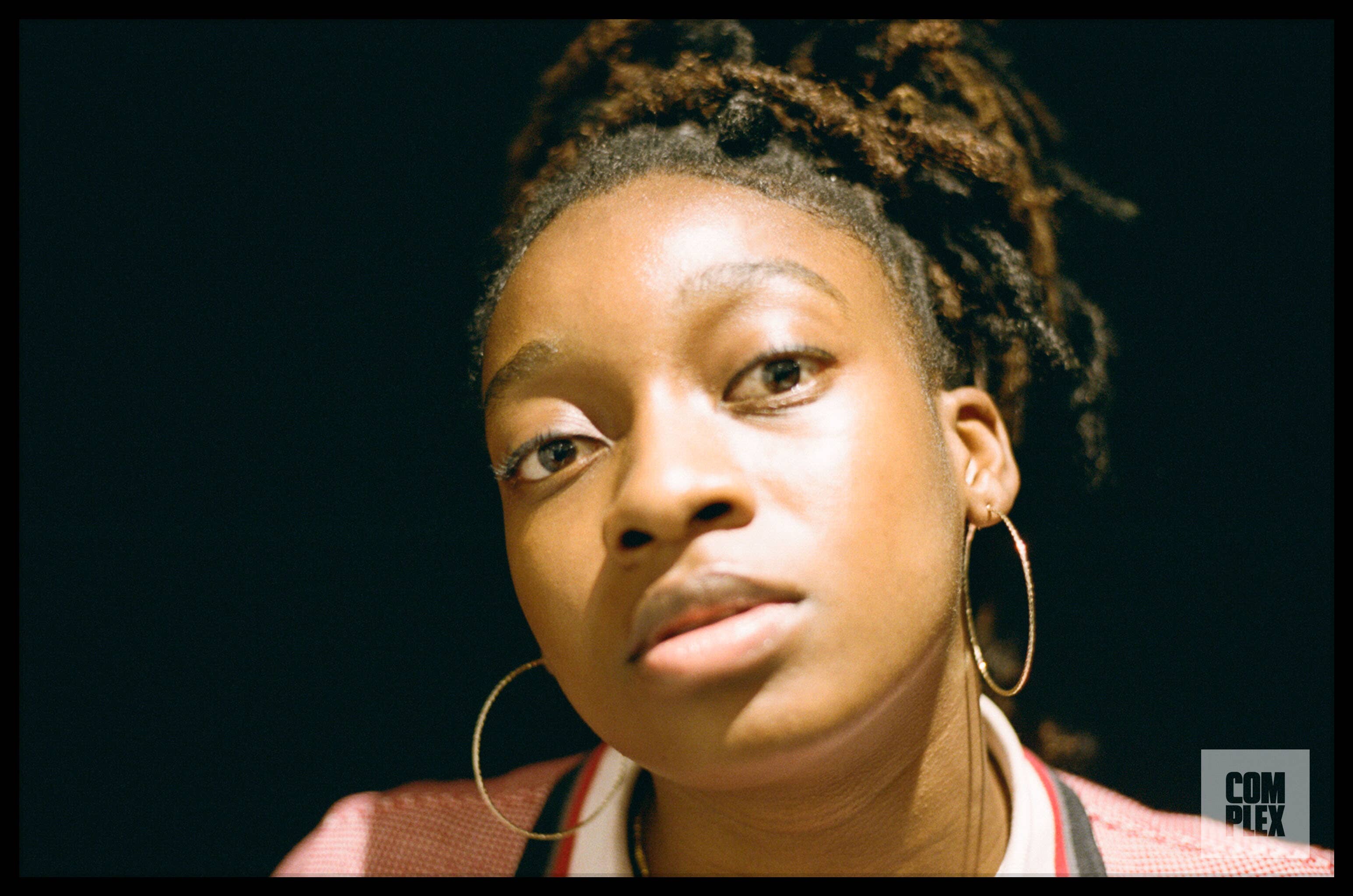
On the eve of the release of her third studio album, GREY Area, Little Simz is resolved. As we sit down and chat a stone’s throw away from St. Paul’s Cathedral, the artist, real name Simbi Ajikawoshe, is in a fairly pensive mood—languid even. Today, she’s observing and living life at a much slower space compared to four years ago, when she released her debut album A Curious Tale Of Trials + Persons. GREY Area marks a new chapter in 25-year-old Simz’s life, where the music and the personal both come to a head. “When I first started writing for this album, I didn’t have a particular concept in mind,” she tells me. “It’s the first time I had spent a long time with a producer in the studio. On all my other projects, people would just send me beats, but this time I locked in with one producer, Inflo, and stayed stationary.”
Two years ago, the North London wordsmith began documenting her life and travels through photography, and it was a decision that led to her creating the artwork for the LP’s lead singles herself. “I wanted it to be as much my vision as possible,” she says. “When I was coming up with the ideas for each image, I realised that only I could capture what I had in mind. Photography is something I’ve been doing on the low, but this is the first time I’ve really started to showcase it.” While many artists and creatives are increasingly multi-skilled through DIY means, photography has given Little Simz another medium to tell her stories. Combine that with the two Welcome To Wonderland festivals she curated, and the artist has come to the realisation that through using a number of mediums, she is able to reach different audiences while telling a single story.
“I think it was just focusing on one thing at a time that changed the way I felt about my music. It’s like, I can’t be in four relationships at once.” But where she once previously tried to work on multiple projects at any given time, this time around she’s learnt that a single-minded approach can lead to a full-bodied album. “I’ve learnt how to focus my energy on one thing at a time,” Simz says. “Looking back on the Stillness In Wonderland album, I was writing it on tour and I was being pulled in so many different directions while trying to make a record at the same time.” Through rap, Simz tells vivid and personal stories, while grime’s soundscapes and energy allows her to be more threatening, piercing and often confrontational. As a lyricist, Simz is a square fitting into a circle and for a long time, how she was perceived as a rapper was something she thought about a lot; it’s certainly hard to occupy any amount of space as an emcee who is as technical as she is, hence why she wound up on the radar of Kendrick Lamar.
“Jay-Z on a bad day, Shakespeare on my worst days, never been a punk, trust you can get it in the worst way,” she spits with full conviction on “Offence”. But the bravado sounds more self-assured than on previous records. Simz is the rapper’s rapper, and because she continues to refuse to find herself confined to any one sound, her influence may not be truly felt for years to come.
“I don’t want to say I’m content or comfortable—that’s far from the case. But I’m not the frustrated artist I once was.”
“King Of Hearts”, featuring Chip and Ghetts, and the grime-focused remix of “Dead Body” which saw her wax off with Kano and Stormzy, were ferocious displays of Little Simz’s dexterity as both a grime and rap lyricist. “I done took off all heads, have ‘em served on a plate / When you address me, it’s your grace or I can have you meet your grave,” she raps on “King Of Hearts” with as much venom that could sting GZA—one of the world’s most deadliest on the mic. Only now, she’s a lot less concerned with trying to prove this to the rest of the world, and rightly so. “I’m not fighting for anyone’s attention any more,” Simz affirms. “I’ve focused my energy on using my platform to continue dishing out good music and rap. I don’t want to say I’m content or comfortable—that’s far from the case. But I’m not the frustrated artist I once was.”
Understandably, Simbi sees herself in a completely different space musically—which she partly attributes to having improved her own emotional well-being. “I don’t feel as down about things that happen in my life. I go through my emotions when I’m feeling them and I have my days, but maybe that’s because I’ve pulled it out.” It’s something that comes with experience, maturity and three albums under your belt. “Every time I do a project,” she adds, “it’s like I’ve collected a bunch of events that have happened to me, sat with it, and released all of it.” And you can see how she’s arrived at this point since the last album. In an interview with Noisey in 2017, Simz spoke of her desire to explore the world beyond London, due to the lack of love she was receiving, telling the music writer Aniefiok Ekpoudom: “I need to be around people or in a place where I’m constantly getting better at my craft and becoming a better person, where I’m making progress. Being here can feel a little stationary, sometimes.”
In recent years, her collaborative list has featured an eclectic range of artists, including Gorillaz, Isaiah Rashad, Kehlani, Mick Jenkins and VanJess. Working with a variety of artists in different spaces has allowed Simz to feel less claustrophobic these days, and it aligns with the grey area she now sees herself in. For much of her career, Little Simz has felt that she’s been stuck in the margins; her 2017 follow-up single to Stillness In Wonderland, “Backseat”, which features vocals from VanJess and Ella Mai, showed a desire to move beyond that. “All my life been a black sheep / All my life been the black keys / True I never really was a bad breed, my daddy probably rather me an athlete / Man, that nigga move like a taxi / All my life in the backseat,” she rhymes on the song’s hook. It represents a transitional moment in Simbi’s life where she no longer wants to be on the fringes, watching others dictate how she should live her life, and seeks to take back full control.
On earlier projects, the tone was very much that of a rapper on her come-up; it was focused, led by a desire to craft an identity as an artist. GREY Area is arguably Simz’s most stationary drop, in terms of her own ambitions. On tracks like “Therapy” and “Sherbet Sunset”, she details her own experiences with mental health issues and relationship breakdowns. Simz tells me that she’s on the road roughly 300 days out of the year, not leaving nearly enough time for rest. After writing Stillness In Wonderland on tour, she learned a valuable lesson—“Learning to listen a bit more has helped. When people tell you to chill, it’s not because they want to fuck with your cash flow but because they care about you.”

“When people tell you to chill, it’s not because they want to fuck with your cash flow but because they care about you.”
By taking a single-minded approach to creative projects, this has allowed Simz to evade burnout, which is something we tend not to pay attention to until it’s too late. “I think I overwhelmed and overworked myself,” she admits. “I don’t regret anything, but I recognise now that I don’t need to say yes to everything.”
For a lot of people in their mid-to-late twenties, adjusting to changes in friendship circles can be a real shock to the system and nothing quite prepares you for the breakdown of a friendship. But Simbi is taking it in her stride, and realises that it’s all a part of growing. “It’s a constant stage of finding one’s self,” she says. “I find it quite challenging considering my lifestyle and what I do for a living, and being in my mid-twenties, trying to figure shit out, you realise nothing is ever black and white. Everything is multilayered, people are multilayered, and life is complex. No one told me any of this, but our twenties aren’t always that lit and you have to live it before you realise.”
GREY Area sees Little Simz tackle the growing pains of her mid-twenties, wielding her words as weapons, wading through those feelings and emotions while still striving for success. Sonically, the set traverses through contemporary jazz, funk, hip-hop and soul, a result of years of genre-bending and positioning herself as an auteur. Despite producing seven EPs, four mixtapes and three LPs spanning a nine-year period, she has never quite had the breakout moment many of her peers have enjoyed. That being said, with each release, she has strengthened her legacy by continuing to carve out her own lane on a crowded expressway.
For a long time, critics noted how Little Simz hadn’t quite found her voice on earlier projects—but given her skills as both a grime and rap spitter, a photographer and festival curator, perhaps it isn’t that she never found her voice, but rather she’s been using multiple to tell a single story: Her own.

